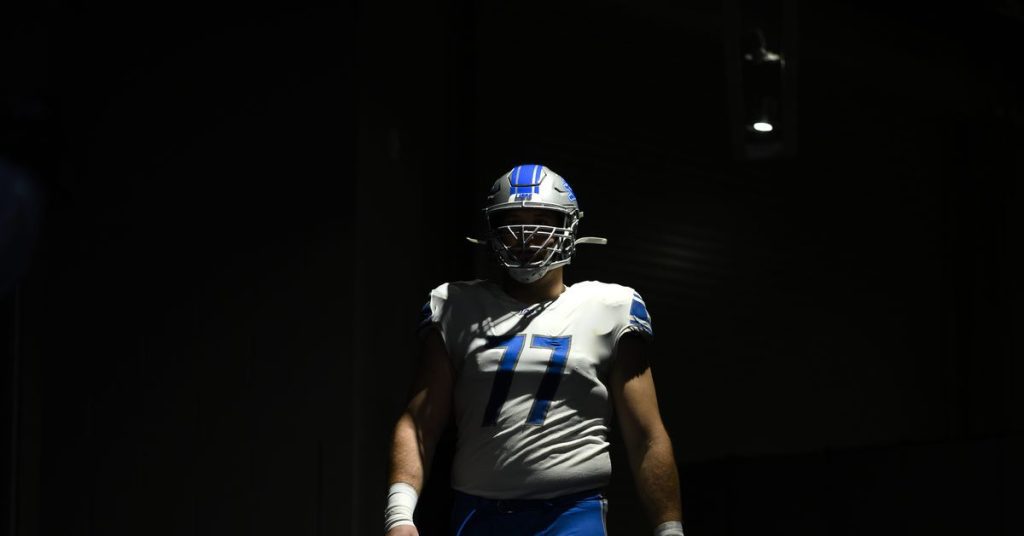Frank Ragnow’s sudden retirement has stirred deep emotions among Detroit Lions fans. He played at an elite level, dominating the trenches and serving as the backbone of the offensive line, reflecting the team’s gritty spirit with impressive durability. After years of hard work, Ragnow deserves recognition, making a compelling case for his induction as the 22nd member of the Lions’ Hall of Fame, the Pride of the Lions.
It’s Ragnow’s Time
Throughout his seven seasons with the Lions, Frank Ragnow experienced significant highs and lows. Originally a first-round pick, he became a four-time Pro Bowler and three-time Second-Team All-Pro, contributing to two NFC North championship teams. He navigated the tumultuous era under Matt Patricia and Bob Quinn, emerging as a key leader in the Dan Campbell and Brad Holmes regime. Ragnow notably connected two eras—snapping the ball first to Matthew Stafford and then to Jared Goff, two of the franchise’s most talented quarterbacks.
Ragnow stood as one of the last ties to the “old guard,” playing a crucial role in elevating the franchise from years of despair. The Lions’ record was only 18-52-2 (.250) during the first half of his career, illustrating decades of struggle. However, with Campbell at the helm, the team’s resilience shone through, achieving a remarkable 35-9 (.795) record in the last two and a half seasons. This dramatic turnaround is one of the most notable in modern sports, and Ragnow was essential in establishing that foundation.
The Lions have honored many of the obvious candidates for the Pride of the Lions from the pre-Super Bowl era. In recent decades, Ragnow’s 100 career starts (including playoffs) rank 29th in team history. While this is significantly fewer than Dominic Raiola’s franchise record of 205, Ragnow’s four Pro Bowl selections are tied for the sixth-most among Lions in the Super Bowl era.
Statistical measures often fail to fully capture Ragnow’s influence. He contributed to one of the most productive three-year offensive periods in team history, helped form what many regard as the best offensive line in the league, and established the culture that now defines the franchise. As a three-time captain, Ragnow was the key figure in the Lions’ trenches, appreciated by teammates, coaches, and fans alike. He ranks among the top three Lions offensive linemen of the Super Bowl era, and honoring him in the Pride of the Lions while his contributions are still fresh would be a meaningful tribute to one of the franchise’s finest players and a premier center of his generation.
A Rich Tradition
The Pride of the Lions, established in 2009, represents the organization’s highest individual honor. The inaugural class included 12 inductees, all enshrined in the Pro Football Hall of Fame. Since then, additional Hall of Famers who made significant contributions to Detroit have been inducted, along with several standout players without Canton busts.
Currently, the Lions have no immediate Hall of Fame candidates on the horizon; the next likely inductees are still active and years from eligibility. However, a Hall of Fame nod is not a prerequisite for the Pride. Ragnow’s early retirement, following seven outstanding seasons without First-Team All-Pro selections, may not meet the Hall’s criteria, but his impact in Detroit certainly justifies a permanent place alongside the franchise legends at Ford Field.
Time for Change
The current makeup of the Pride of the Lions mirrors the franchise’s long-term struggles. Among the 21 members, only six played for the team post-1977. A revitalization—emphasizing more recent cornerstones—would be a timely and welcome evolution.
Unlike other teams, the Lions have not made their criteria for induction, decision-makers, or enshrinement schedule public. Some teams formally induct one or two members each year. Implementing a more standardized process—like honoring one player each year—would not undermine the honor but rather highlight the team’s transformation. The Lions are no longer perpetual underperformers; they are now consistent contenders, and their Hall of Fame should reflect this shift, with Ragnow as an ideal candidate to lead this new chapter.



